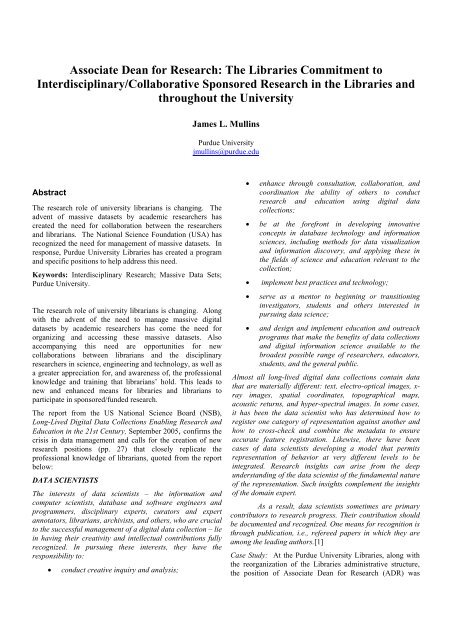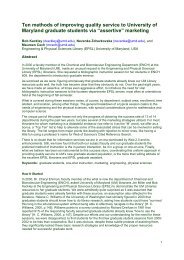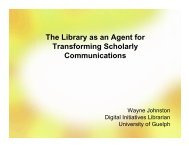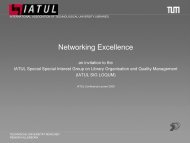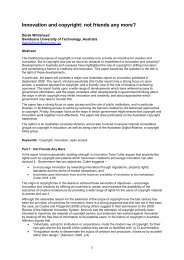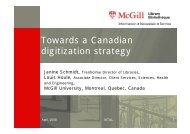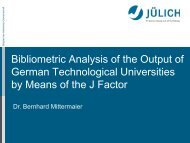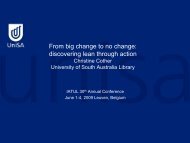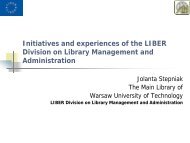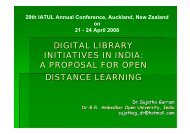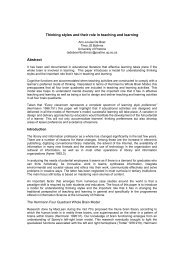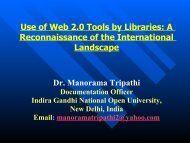PDF Document - IATUL
PDF Document - IATUL
PDF Document - IATUL
Create successful ePaper yourself
Turn your PDF publications into a flip-book with our unique Google optimized e-Paper software.
Associate Dean for Research: The Libraries Commitment to<br />
Interdisciplinary/Collaborative Sponsored Research in the Libraries and<br />
throughout the University<br />
James L. Mullins<br />
Purdue University<br />
jmullins@purdue.edu<br />
Abstract<br />
The research role of university librarians is changing. The<br />
advent of massive datasets by academic researchers has<br />
created the need for collaboration between the researchers<br />
and librarians. The National Science Foundation (USA) has<br />
recognized the need for management of massive datasets. In<br />
response, Purdue University Libraries has created a program<br />
and specific positions to help address this need.<br />
Keywords: Interdisciplinary Research; Massive Data Sets;<br />
Purdue University.<br />
The research role of university librarians is changing. Along<br />
with the advent of the need to manage massive digital<br />
datasets by academic researchers has come the need for<br />
organizing and accessing these massive datasets. Also<br />
accompanying this need are opportunities for new<br />
collaborations between librarians and the disciplinary<br />
researchers in science, engineering and technology, as well as<br />
a greater appreciation for, and awareness of, the professional<br />
knowledge and training that librarians’ hold. This leads to<br />
new and enhanced means for libraries and librarians to<br />
participate in sponsored/funded research.<br />
The report from the US National Science Board (NSB),<br />
Long-Lived Digital Data Collections Enabling Research and<br />
Education in the 21st Century, September 2005, confirms the<br />
crisis in data management and calls for the creation of new<br />
research positions (pp. 27) that closely replicate the<br />
professional knowledge of librarians, quoted from the report<br />
below:<br />
DATA SCIENTISTS<br />
The interests of data scientists – the information and<br />
computer scientists, database and software engineers and<br />
programmers, disciplinary experts, curators and expert<br />
annotators, librarians, archivists, and others, who are crucial<br />
to the successful management of a digital data collection – lie<br />
in having their creativity and intellectual contributions fully<br />
recognized. In pursuing these interests, they have the<br />
responsibility to:<br />
• conduct creative inquiry and analysis;<br />
• enhance through consultation, collaboration, and<br />
coordination the ability of others to conduct<br />
research and education using digital data<br />
collections;<br />
• be at the forefront in developing innovative<br />
concepts in database technology and information<br />
sciences, including methods for data visualization<br />
and information discovery, and applying these in<br />
the fields of science and education relevant to the<br />
collection;<br />
• implement best practices and technology;<br />
• serve as a mentor to beginning or transitioning<br />
investigators, students and others interested in<br />
pursuing data science;<br />
• and design and implement education and outreach<br />
programs that make the benefits of data collections<br />
and digital information science available to the<br />
broadest possible range of researchers, educators,<br />
students, and the general public.<br />
Almost all long-lived digital data collections contain data<br />
that are materially different: text, electro-optical images, x-<br />
ray images, spatial coordinates, topographical maps,<br />
acoustic returns, and hyper-spectral images. In some cases,<br />
it has been the data scientist who has determined how to<br />
register one category of representation against another and<br />
how to cross-check and combine the metadata to ensure<br />
accurate feature registration. Likewise, there have been<br />
cases of data scientists developing a model that permits<br />
representation of behavior at very different levels to be<br />
integrated. Research insights can arise from the deep<br />
understanding of the data scientist of the fundamental nature<br />
of the representation. Such insights complement the insights<br />
of the domain expert.<br />
As a result, data scientists sometimes are primary<br />
contributors to research progress. Their contribution should<br />
be documented and recognized. One means for recognition is<br />
through publication, i.e., refereed papers in which they are<br />
among the leading authors.[1]<br />
Case Study: At the Purdue University Libraries, along with<br />
the reorganization of the Libraries administrative structure,<br />
the position of Associate Dean for Research (ADR) was
created. It was determined to be critical that the Libraries’<br />
administrative positions reflect the goals of the University –<br />
learning, discovery, and engagement – rather than assume a<br />
more traditional administrative structure. Hence, the decision<br />
was made to restructure positions, for example, creating the<br />
Associate Dean for Learning, replacing the previous Director<br />
for Public Services. New positions were created, such as the<br />
Associate Dean for Research. Three additional positions<br />
comprise the Libraries administration: Associate Dean for<br />
Planning and Administration; Associate Dean for Collections<br />
and Information Resources; and Associate Dean for<br />
Information Technology.<br />
The Associate Dean for Research position quickly evolved<br />
from the Interdisciplinary Research Librarian initially<br />
designed to relate and identify more closely with<br />
interdisciplinary, collaborative sponsored research endeavors.<br />
The Dean of Libraries and the Interdisciplinary Research<br />
Librarian met with virtually every department and center on<br />
campus in an effort to understand the research agenda within<br />
each department /center; through this effort it was possible to<br />
see potential connections between departmental research<br />
needs and library/librarian partnerships.<br />
Purdue University has a council that represents universitywide<br />
research interests. The Dean of Libraries sits on the<br />
council; at the first meeting, however, it was noted that other<br />
council members were Associate Deans. This led to the<br />
decision that the relevant person to represent the Libraries<br />
was an individual associated with research. The logical<br />
individual was the Interdisciplinary Research Librarian, but<br />
council participation was restricted to dean level positions.<br />
The Interdisciplinary Research Librarian became the first<br />
Associate Dean for Research, more effectively reflecting the<br />
significance of this position within the university, and also<br />
making the individual in that position eligible to sit on, and<br />
contribute to, the council. It has been greatly beneficial to<br />
have the ADR serving on the University Research Council for<br />
it has provided access to discussions occurring at the highest<br />
levels within the research area of the university, and has<br />
enabled the message about the librarians; abilities,<br />
willingness, and desire to collaborate on sponsored research<br />
to expand.<br />
While serving on the council was important, the strongest<br />
need for the ADR was the Libraries’ new role in exploring<br />
collaboration on sponsored research projects with academic<br />
departments in the sciences, engineering and technology.<br />
The new ADR position, in part, replicates the structure and<br />
responsibilities within these academic departments. The<br />
Dean of Libraries met with Deans and Department Heads of<br />
the related departments, to propose and demonstrate this new<br />
working relationship and link between the departments and<br />
the libraries. Without exception, the concept was well<br />
received by the Deans and Department Heads. The ADR<br />
then set meetings with faculty and researchers. The<br />
responses have been successful in fact the new challenge is<br />
addressing the number of requests that are being received to<br />
create collaborative research proposals with librarians as a<br />
joint principal investigator. To date, joint proposals have<br />
been submitted by departments in Biology, Chemical<br />
Engineering, and Electrical/Computer Engineering.<br />
In the spring of 2005 no members of the Purdue Libraries<br />
faculty were involved in collaborative, interdisciplinary<br />
research projects. One year later, in the spring of 2006,<br />
eleven Purdue Libraries faculty were involved in<br />
interdisciplinary research projects. The image and relevance<br />
of librarians has been enhanced and their reputation is<br />
growing among faculty colleagues, particularly in the<br />
sciences, engineering, and technology. The Associate Dean<br />
for Research in is a key individual in this new and dynamic<br />
environment.<br />
To enable the ADR to respond quickly to the expectations<br />
placed upon the Libraries to support the challenge of massive<br />
data sets, in early 2006 the Libraries began the search for two<br />
Data Research Scientists. The description for these positions<br />
is closely modelled on the Data Scientist described above.<br />
These positions will be funded up-front for three years by the<br />
Libraries, with the assumption that by the end of the three<br />
years both positions will be completely funded through<br />
external grants. The first Data Research Scientist is expected<br />
to be in place in the summer of 2006. The primary role of the<br />
Data Research Scientist will be to collaborate with faculty<br />
colleagues on sponsored research projects as well as<br />
furthering the Purdue Libraries’ research agenda in the areas<br />
of taxonomy, ontology, and metadata as they relate to the<br />
management of massive data sets.<br />
Conclusion:<br />
In less than two years the challenge of managing massive data<br />
sets at Purdue University has moved from the purview only<br />
of computer scientists and technologists, to being highly<br />
visible in the arena of librarians. It portends a great future for<br />
the field of librarianship - while the 20 th century may be<br />
recognized as the golden age of libraries, the 21 st may be<br />
remembered as the golden age of librarians!<br />
References<br />
[1] National Science Board, “Long-Lived Digital Data<br />
Collections Enabling Research and Education in the 21st<br />
Century”, pp.27, (2005).


